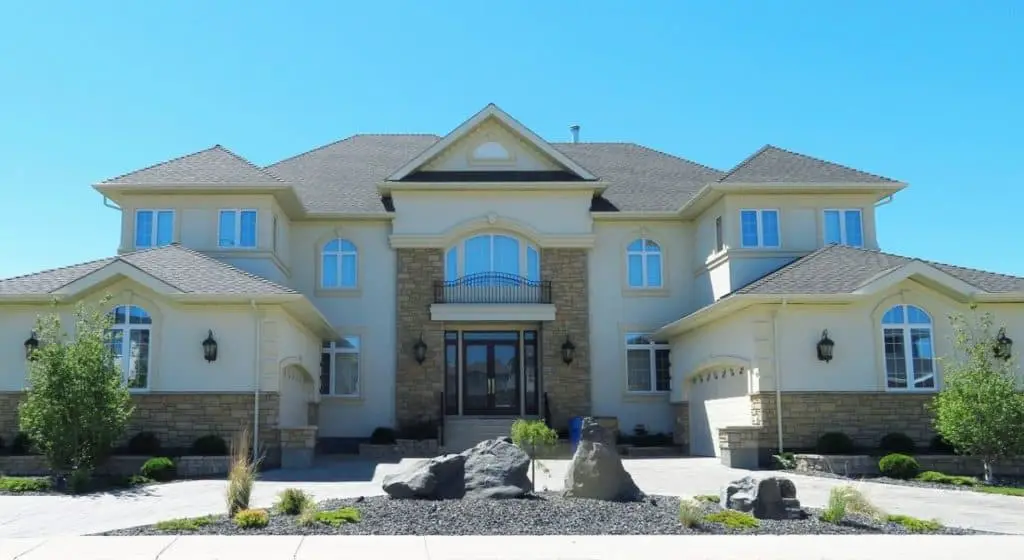
Recently, Mrs. Average Doctor and I were house hunting. During our search, our realtor suggested that due to our incomes, we should look into the most expensive neighborhoods in town. According to her, doctors could easily afford million dollar homes. But can they really?
Due to their high incomes, doctors should be able to afford to afford million dollar homes. With tools like the physician mortgage program, buying expensive homes has become increasingly easy for physicians. However, while purchasing a million dollar home can be a good idea at the time, it is not always the correct financial decision.
After driving through the expensive neighborhood, we decided not to purchase the million dollar home in the most expensive area of town. In fact, after doing our homework on how much we should be spending on a home, we decided to significantly lower our price range. Even accounting for our high physician salaries.
I’ll explain why.
Should The Average Doctor Buy A Million Dollar Home?
A little background on Mrs. Average Doctor and I. We are both attending physicians who recently graduated from residency. Since the start of medical school, we’ve been renting apartments every year. That’s over 10 years of apartment rentals.
And over those years, I’ve followed the traditional advice to not buy a home unless three things are in place. The three classic requirements to meet before buying your first home:
- Control over your debt.
- A stable job.
- The right location.
It wasn’t until recently that we satisfied those conditions.
In residency, we could barely touch our debt. And it wasn’t until Mrs. Average Doctor graduated plus a few more years to know if we liked our jobs. Plus, we had no idea if we wanted to stay in the city where we did our residency training.
It took a while to meet those three condition, but as attending physicians we liked our jobs (condition 2), made enough money (condition 1), and finally decided on where we wanted to live (condition 3).
And boy are we both ready to get out of our apartment phase and buy a house of our own.
We both felt like we were missing out on something. A feeling that only got worse when friends of ours were so successful doing their own thing.
One of them bought a house in medical school, went to residency in the same city, and made a tidy profit when it sold. Others bought houses in the last yer of residency well before they had stable jobs or high incomes. The FOMO was real.
So then why didn’t we buy one of those million dollar homes, and why are we still living in an apartment?
Who Can Afford A Million Dollar Home
One of the first things you’ll ask when you decide to buy a house is “How much house can I afford?”. Don’t worry, there are plenty of internet calculators out there to answer that question for you. The traditional answer?
The 26/38% rule: Don’t spend more than 28% of your gross monthly income on housing expenses and no more than 36% on total debt.
Even Dave Ramsey agrees, multiple your gross monthly income by 25% to get your maximum mortgage costs.
Seems simple enough. For example, an average physician making $25,000 gross per month could afford a mortgage of $6250 per month. Assuming 3.2% interest, 0 down, and a 30-year fixed rate mortgage, that’s a $1,300,000 house.
Surprised? I was. With average salaries around $300,000, a physician can technically afford a pretty expensive house. A two physician household? It starts getting ridiculous. But that’s why our realtor wanted to show us the million dollar neighborhood. Because as doctors, we could afford it.
But we decided not to.
It’s easy to get pulled in to the glamour of owning a million dollar house. Especially when your realtor is encouraging to by one (without bringing up exactly how much commission he’d get). But I’ll give you two reasons not to. First, the true costs of homeownership. And second, opportunity cost.
The Costs of Homeownership
Houses cost a lot more than just the monthly mortgage. You might have seen the phrase PITI when looking up costs of homeownership. It stands for Principle, Interest, Taxes, and Insurance. But there’s more still.
How big is that million dollar house? The ones we saw were over 3000 to 4000 square feet. How much does the air conditioning cost? What about the furniture to fill all those empty rooms? Is the house turnkey or are you going to do renovations? What about lawn care and other maintenance?
These costs can add up quickly, and they add up to a tidy sum.
Compare that to our 1100 square foot apartment with a maintenance company, a pool, and a parking garage and the apartment starts to look like a pretty good deal. At in terms of time and money.
The Opportunity Cost of Buying A house
The other question you want to ask when buying a house is “Would I rather spend this money on something else?”. That’s called opportunity cost, or the fact that when you make a decision you’re deciding not to make your second choice decision.
For example, would you want to spend $6500 on a mortgage? Or is some of that money better spent on your student loans? What about other investments? Or maybe even nicer clothes or fancier dinners? The opportunity cost of the mortgage is that you can’t spend that money on those other things.
Of course, where and how you decide to spend your money is up to you. But once you sign up for a $1.3 million mortgage, that money’s going to the mortgage.
Me? I want a house pretty badly, but more than that, I want to reach FI. I’d rather pay off our debt and invest in index funds.
To the dismay of our realtor, we decided the costs of a million dollar house were simply too high.
How Much House Should a Physician Buy?
If the traditional 26/38% rule has physicians buying way too big, way too expensive houses, is there another way to figure out how much house a physician should buy? There is, an it’s another general rule of thumb that works for high earner. It goes like this:
Buy a house that costs no more than double your salary.
Following this rule, instead of a $1.3 million mortgage, the average doctor making $300,000 per year should find something that costs less than $600,000. This is much more reasonable for physicians.
Of course, this is just a rule of thumb, and it runs into problems in certain situations, like a dual physician income. If one physician averages $300,000 per year, it stands to reason that two should make $600,000. Following the 2x rule, these physicians should buy a house that costs less than $1.2 million. Here we go again with the million dollar homes.
But I have a fix! Two physician households should buy a house that costs no more than double one of their salaries. Which one they choose is up to them.
When Should A Doctor Buy A Million Dollar House
This whole time, I’ve been telling you that physicians shouldn’t be buying million dollar homes. Well, like any rule, this one also has an exception. It’s called the homestead exemption.
Some states, like Florida, Texas, Oklahoma, and others have a law referred to as the homestead exemption law. This is a legal provision designed to protect the value of a “principle dwelling place”. In other words, it prevents your creditors from seizing your home.
Now, these homestead exemptions vary by state. Not only do some states not even have them, but in the states that do, they’re not always the same. Some won’t cover 100% of the value of your home. If you’re a physician thinking about buying a million dollar house, it might be worth talking to your CPA or tax expert to know if the homestead exemption works for you.
Final Thoughts
In summary, doctors can buy million dollar homes. But even though traditional mortgage calculators, real estate agents, and mortgage companies will tell them to, it’s not always a good idea. Expensive houses have lots of hidden costs you might not initially consider, and all that money you spend on the house is money you can’t put toward something else.
If you are a physician considering buying a house, I recommend following these simple rules:
Don’t buy a house unless you:
- Have control over your debt
- Have a stable job
- Plan to stay in that location for at least 5 years.
and
As a general rule of thumb, buy something that costs less than double one of your household’s physicians’ incomes.
And if you do want to buy a million dollar house, I hope your state has a good homestead exemption.

